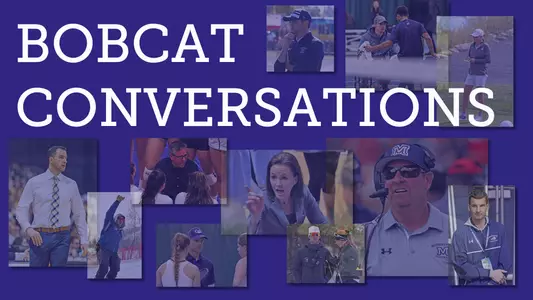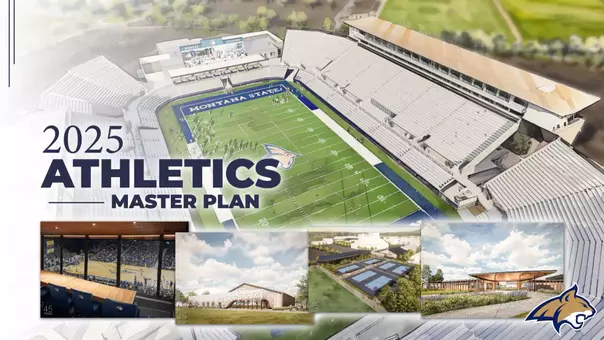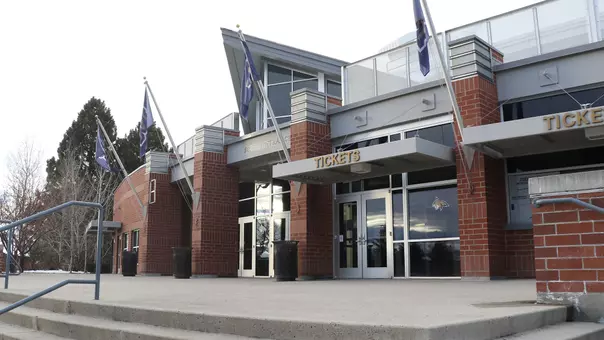
MSU Director of Student-Athlete Wellness Aaron Grusonik
4/14/2020 9:18:00 AM | General
Aaron Grusonik is helping guide Bobcat student-athletes through an unusual spring
As the Director of Student-Athlete Wellness in Bobcat Athletics, Aaron Grusonik, PsyD., works with all Bobcat teams in areas ranging from mental wellness and life balance to athletic performance. During his decade at Montana State he has worked in the Counseling Center on campus, and as Assistant Dean in MSU's Office of Student Life. In his current role he coordinates the effort to support each of the department's student-athletes. Grusonik was a multi-sport Division I student-athlete at St. Mary's (California), and also has a coaching background.
You joined Bobcat Athletics from an Associate Dean position on campus, can you describe your work in that role? "As the Associate Dean I oversaw what we saw the campus safety and welfare program, so that was reaching out to students in need who people thought were struggling for various things, mainly emergencies or emotional health issues. I would get referrals – we had an on-line reporting form – from faculty, staff, other students, anybody who was worried. A parent could call, even. When someone said they were worried about a student I would reach out and see if I could initiate a meeting with that person to see if they actually were struggling with something and see what kind of help we could get them. Luckily most of the time, 80 percent of the time, the students weren't dealing with anything really intense or stressful. But that 20 percent of the time or so there actually were more serious worries about harm to self or harm to others, but you never knew the first meeting going in what you were going to get."
What is the difference between that role and this role? "They're pretty similar, actually. Right now I'm still doing the same kind of reaching out when we're worried about an athlete, but right now my focus here in Athletics is much more on sports performance and that kind of wellness so I do have quite a few meetings with students based on their athletic performance or wanting to improve themselves in their sport from a mental health standpoint. So that's a little bit different. Our student-athletes still represent the campus population in terms of the struggles they deal with, so we do have students who are struggling with more serious mental health or other concerns. But I'd say the difference is a lot of them are coming in to see me voluntarily and they want to improve their performance."
How have you found the transition? "It was pretty easy, actually. It was a pretty quick transition, so I kind of hit the ground running and started seeing student-athletes the same week I started. When I did my doctorate I did my research on athletes and their mental health challenges, so I feel like I had a good background, and also I was an athlete myself in college and coached quite a bit so I'm able to jump back into those ways of thinking or roles with people, so the transition wasn't that difficult, really. The main thing is going from the larger campus population to the smaller student-athlete population, so I do get to interact with people in the culture, talking with their coaches and talking with their teammates. I did not have the chance to do much group work (on campus), but I'm doing a lot of team work (in Athletics) now, which I really enjoy. So that was a little bit of a difference in the transition, but in terms of the skills and my background it seems to me like it was a pretty easy transition."
How does your background as a student-athlete inform how you approach your role in Bobcat Athletics? "I think it gives me an extra level of empathy for both sides, for the coach who sometimes may have to make difficult decisions or is worried about their student-athlete, I've been there in dealing with the stress of wanting to do what's best for the team and also for the individual, balancing that, and as an athlete a lot of the things that I help our student-athletes with I certainly went through, the doubt you can have or the pressure. Our athletes have to manage so many different things, whether that's representing MSU or keeping up their academics and also everything related to their sport, which is grueling by itself. That's a full-time job."
You competed in crew and water polo at Saint Mary's. Is that a common double? "It's not a common double at all. When I first went to Saint Mary's they had a very rudimentary water polo team. I was looking to do something and they were having tryouts for the rowing team. I had not really done much of that before, but in terms of the physical side of it I was physically fit and able to make the cut on that team with a lot of the different physical aspects. Once I learned the technique of the rowing I was able to pick that up pretty easily, and I was able to earn myself a spot on the team. There are some things that are interesting with rowing, there are a lot of movements, especially on the crew shell, you have to move yourself in a way that you wouldn't normally do, so it's kind of like patting your head and rubbing your stomach at the same time, but for whatever reason that came to me pretty easily. I don't know if that was (the background in) water polo and some of the ball-handling or what, but I was able to transfer some of those over and ended up being a fairly decent rower. It wasn't my first choice of sports, but I gave it a go. There was a steep learning curve, but I was able to do it. I always tell people my sports are on the water or in the water. I only rowed for my freshman year and then the water polo program took off, so I played water polo all four years."
What are the most important things you communicate to student-athletes? "The biggest thing that I try to communicate to the athletes is to focus on their own personal strengths, and when I say that everybody's strengths are different. So we focus on what makes (each athlete) a competitor, and that's different for every person, so what makes (them) a strong competitor and how can they rely on those skills in every situation they encounter. I try to help them focus on that and the idea that using their strengths and building on new ones they can rise above any challenge that comes their way, whether that's a personal challenge or a challenge in their sport. When they think about things as a challenge it doesn't seem like a threat, and if it doesn't seem like a threat then they don't have anything to be anxious or worried about when it comes to performing. So we do a lot of work on building strengths and seeing challenges as putting the pieces of a puzzle together. Every person that they compete against and every team that we play is beatable, it's just about figuring out the puzzle pieces in the right way."
What surprised you about the process of supporting Division I student-athletes over the past nine months? "I worked pretty closely with Athletics before when I worked in the Dean's office so I don't think anything's been a surprise, but what I think I've appreciated the most is how close-knit the people in Athletics are with each other, whether that's student-athletes or coaches, it's a family. There's challenges in any family but the goal is the same for everybody and I think that what's impressed me the most is just how powerful that can be when everybody has the same goal and that's supporting each other, living our lives in the best way we can as Bobcats, and then also people in the community. I think that's struck me the most and is probably the biggest thing that I'm proud of when I say I work in Athletics. And like I said before, I hit the ground running and I was surprised by how quickly I was accepted and people started utilizing the services. I didn't have to go give very many pitches at all, I started getting a full load of students right off the bat. That was kind of a surprise because I thought I was going to have to do a little more promoting. (laughs)"
Do you find mental health issues less stigmatized than when you began in this profession? "Even since I started at MSU – I started in the Counseling Center on campus and then moved over to the Dean of Students Office, so I've been here for just over 10 years – and even in that 10 years I've seen that stigma shift, with students seeking out services themselves, students who come in as first-year students who want to see a counselor or therapist before school even starts is increasing. So definitely the stigma is going in a good direction in terms of people getting help, and that even starts with them getting help at home before they even get (to MSU) and becoming familiar with those resources. There's still a long way to go but I think in terms of students talking about mental health I think that's greatly increased."
What are you hearing from students specific to these uncertain times that you haven't previously? "Being in this situation is doing a few certain things, and I think it boils down to the isolation. Some students really thrive with the personal interactions with others and some are more introverted and don't. Regardless of whether they are more outgoing or more to themselves there are the same challenges. A student who is very outgoing and social can't get as much of that right now so they're feeling that there is something missing in their lives, and a student who is a little more to themselves, they might feel a little less impacted because that's kind of their comfort zone but they do isolate more than what's good for them and can fall off the radar a little bit. So universally I've seen in behaviors that the sleeping patterns and the awake patterns are very skewed right now for almost all of the students, staying up super late, sleeping in super late, and the schedules that their teams in Athletics and their instructors have helped them keep are falling to the wayside quite a bit. I think that sleep hygiene is a huge factor right now."
When you think of concept of student-athlete wellness, what does that mean to you? "When I think of student-athlete wellness the important idea is living a balanced life, living a life that is healthy and safe. I think that means balance in all areas – self-care, athletics, school, other likes and interests – dedicating enough time in a balanced way to those things. Having balanced mental health is certainly one of those important areas. In athletics and in life in general, learning how to do things in a different way is important. Most of our student-athletes have gotten where they are academically or in their sport by working really hard and having natural talent, and now they are facing a lot of other people who are really gifted in their sport and academically, who have the talent and who have worked hard. Learning to tap into something new is important, and that's where the mental side of sports comes in. All of our athletes are skilled, all of them are talented, they all know how to work hard, and they're all good. What sets the great ones apart from the good ones, I think, is having good mental health skills, good nutrition, those kinds of things. Helping athletes try something different that will help them get that extra edge, understanding the lessons that they learn, tapping into those lessons in ways that are new and different, are also life lessons. Being able to push through new challenges teaches us things about ourselves that we can take into other areas of our lives and throughout our lives."
The process of supporting student-athletes overlaps with several other segments of an athletic department, such as nutrition and sports medicine, how have you found that interface? "I've found that really rewarding. I have a few meetings each week where I sit down, sometimes with coaches, nutrition, strength, athletic trainers, and when we all sit down together with a common goal it's really rewarding because everyone has a different knowledge base and expertise. When we can all talk about it from a holistic perspective, whether that's a group of students or a team or an individual, it's really rich. I haven't had any situations where egos get in the way or anything like that. There's a dedication to the health and the betterment of the student-athlete, and from that common ground we're able to share our expertise and get creative in how we reach out to the students. With the student-athlete wellness piece I do have a multi-disciplinary team that meets every other week. We discuss the students that we're working with and how we can collaborate, and that includes areas from academics, (strength training), a (physician) from Bozeman Health joins us, and we have people from the Counselling Center and the Dean of Students Office join us, too, so we can get a perspective from outside of Athletics."
#GoCatsGo



















